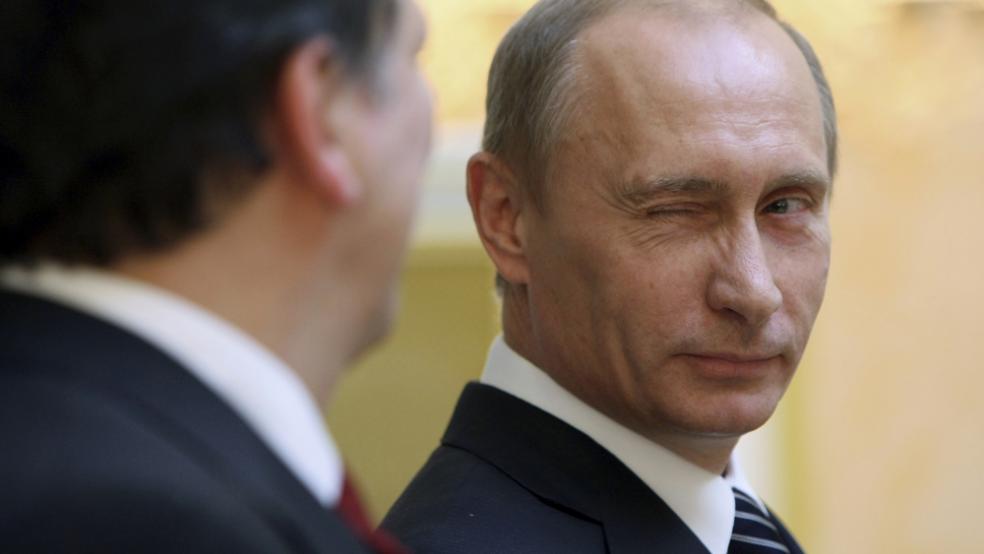Russian President Vladimir Putin made a familiar threat to European nations on Thursday, saying that Russia’s state-controlled energy giant Gazprom would cut natural gas supplies to Ukraine if it did not pay its bills. He warned that the disruption could lead to short supplies in European countries.
In a letter to 18 of Gazprom’s European customers, Putin demanded talks on how Ukraine’s economy could improve in a way that would allow it to pay its $2.2 billion debt.
Related: How Putin Awoke NATO’s Sleeping Giant
“Gazprom is compelled to switch over to advance payment for gas deliveries and in the event of further violation of the conditions of payment will completely or partially cease gas deliveries,” Putin wrote in the letter. “Undoubtedly, this is an extreme measure. We fully realize that this increases the risk of (Ukraine) siphoning off natural gas passing through Ukraine's territory and heading to European consumers.”
Threatening to starve Europe of energy by cutting supplies to Ukraine is a familiar power play by Putin. He’s done it three times in the last decade. On one occasion, in 2006, he actually did it, with European allies experiencing a small drop in supplies.
In the past, most energy analysts saw these disputes as a way for Russia to maintain influence in Ukraine. But this threat is happening in a very different strategic environment, with Russia having invaded Crimea and with Russian forces massing on the country’s border with Ukraine. For the first time since the end of the Cold War, there are growing fears that Russia could invade the European mainland.
In the past, European nations have paid lip service to creating a unified energy policy to counter Russia’s threats. But they’ve done little to advance that cause, instead relying on individual national agreement with Russia, and the knowledge that Russia needs European money just as much as Europe needs Russian energy.
Related: Russia’s Move in Crimea Sends China a Dangerous Message
This time is different. The Europeans have an opportunity to show Russia that aggression in Eastern Europe will not be tolerated. They could call Putin’s bluff, allow him to cut gas, and be just fine. Here are three reasons why:
1. A mild winter has allowed Europe to stockpile gas. Warmer than normal temperatures in Europe allowed countries to stockpile gas that could meet demand for months. For instance, Poland’s gas reserves are at 70 percent capacity, Czech and Slovak reserves are between 40 and 50 percent of capacity. Germany has inventories of 60 percent of capacity, and France has 50 days of consumption.
These inventories could allow Europe to wait Putin out without the lights flickering in Paris or Berlin.
2. Russia desperately needs money right now. The Russian economy has taken a huge hit since its invasion of Crimea, with the stock market tanking and the ruble tumbling in value.
Related: Pressure on Putin as Russian Wealth Disappears
“The Crimean invasion has already caused the Ruble to collapse forcing the Russian central bank to aggressively intervene to support it and by doing so it “temporarily” raising interest rates from 5.5 percent to 7 percent,” said Edward Goldberg, a professor at Baruch College and the New York University Center for Global Affairs The decline in the ruble will lead to severe inflation of consumer goods in Russia. But more important it has caused a massive drop in the Moscow stock exchange and exodus of approximately $70 dollars of capital outflow just in this quarter from Russia.”
“Russia supplies about a third of the European Union’s energy but that supply is responsible for 40 percent of the Russian government’s budget,” he added.
3. The Europeans could finally send a unified message on energy to Russia. For years, the European Union has paid lip service to the idea of a unified energy policy. In reality, individual nations have made side deals with Russia to ensure supplies.
Giving Putin a firm no on talks over Ukraine’s debt would finally send a unified message to Russia: you can no longer play politics with the security of our energy supply. At the same time, it would also serve as a condemnation of Russian aggression in Ukraine.
Top Reads from The Fiscal Times
- Intelligence Chair Fears Putin Has New Target: Armenia
- Why Germany and Poland Are Winners in the Ukraine Crisis
- The Woman Who Could Bring Putin to His Knees





